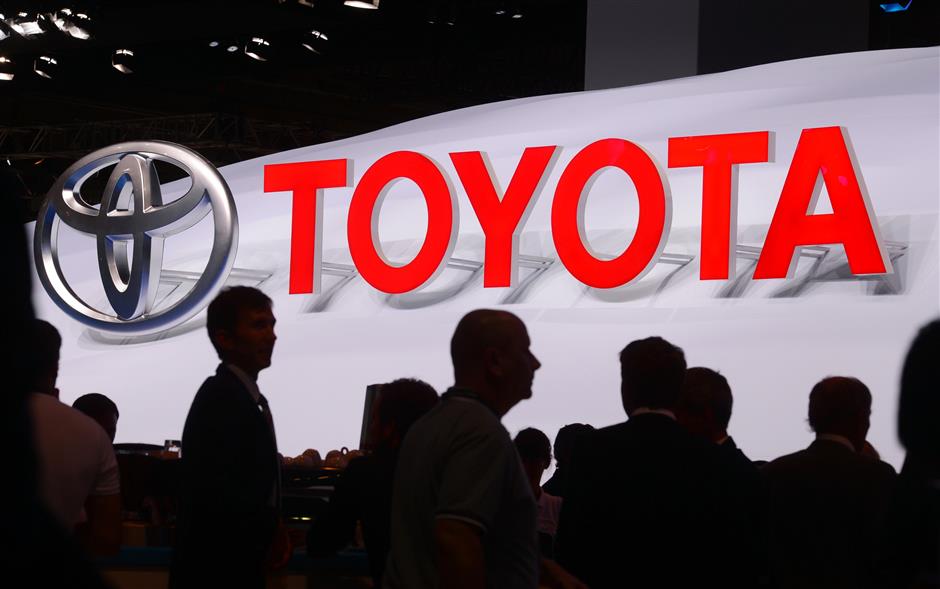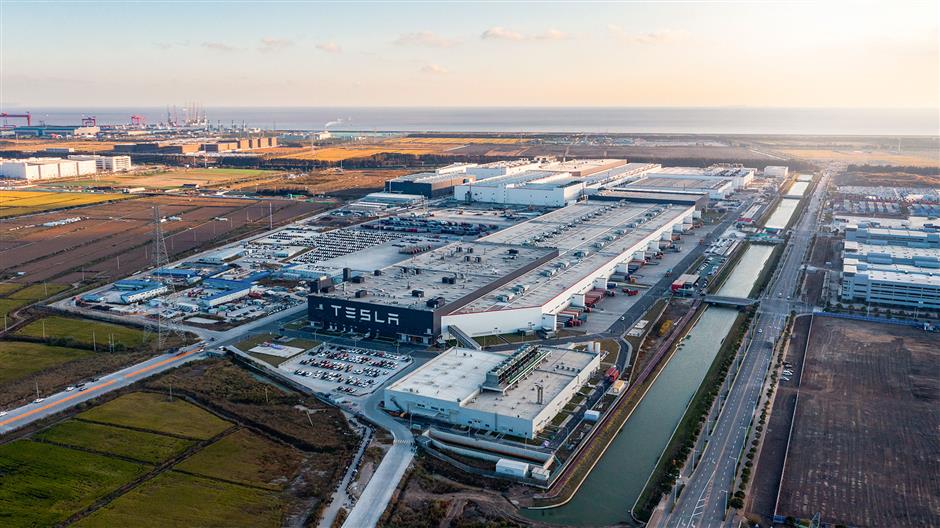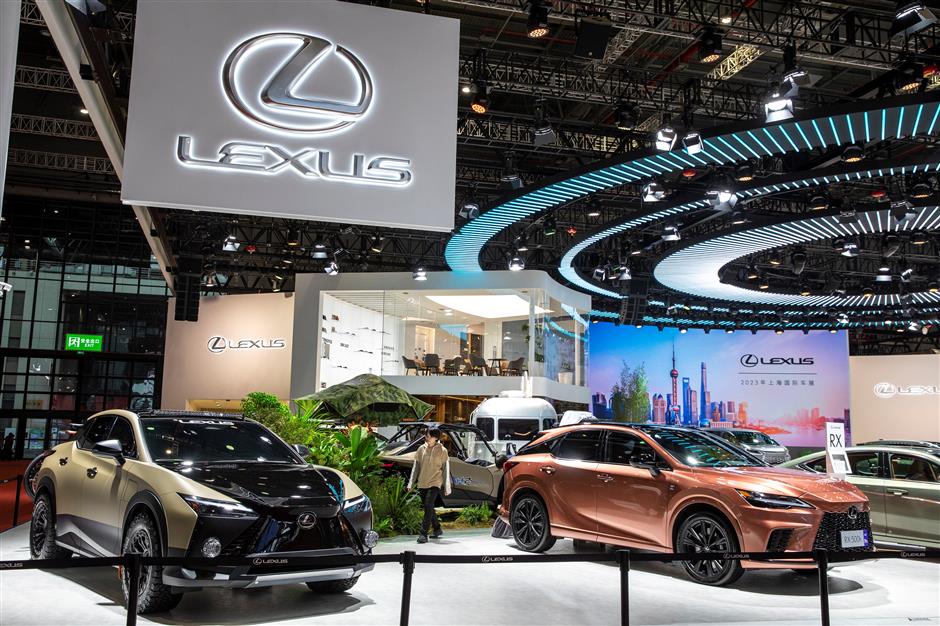
今日上海
“迟到总比不到好!”丰田的上海工厂颠覆了电动汽车战略 - 2025年01月23日
'Better late than never!' Toyota's Shanghai factory flips electric-car strategy
Editor's note:
This is the first of a two-part series discussing reports that Toyota, once a staunch opponent of electric cars, is planning to set up a wholly owned factory in Shanghai to manufacture electric Lexus vehicles.

Beyond expected price wars and consolidation in China's auto industry this year, the biggest guessing game in town is when Toyota will break ground on its much-anticipated wholly owned factory in Shanghai.
Japan's Nikkei news service reported in late December that Toyota has already secured a plot in Shanghai for the new facility, with operations expected to commence around 2027.
However, the exact timeline and specific location remain undisclosed.
Although Toyota has twice dismissed the news as unofficial and declined to comment, the project is widely seen as a foregone conclusion, merely pending formal confirmation.
Reports suggest that the Shanghai factory will focus solely on manufacturing electric vehicles under the luxury Lexus brand, to be sold in China, Japan and international markets.
What's more, Toyota apparently is seeking to source 95 percent of the components from China.
If I were to sum up Toyota's plans in one phrase, it would be: better late than never.
About-face on electric vehicles
It's worth noting that just a few years ago, Akio Toyoda, then chief executive of Toyota, openly criticized electric vehicles. He argued that "electric cars are technologically unsophisticated" and are "not the only way forward for the auto industry."
However, under the stewardship of his successor, Koji Sato, Toyota has decisively abandoned its misgivings and embarked on an ambitious journey toward electrification.
Sato, formerly head of the Lexus brand, has long championed the marque's transition to full electrification.
By 2026, Toyota plans to introduce 10 fully electric models, targeting annual sales of 1.5 million units. By 2030, it aims to hit sales of 3.5 million electric vehicles globally, with Lexus positioned as the "pioneer of electrification."
Starting in 2026, Toyota will use a dedicated electric platform to develop new Lexus models. By 2030, the entire Lexus lineup will be fully electric, with a goal of 100 percent of sales generated by green cars in China, North America and Europe.
The global target is to sell 1 million units annually, with a complete transition to electrification by 2035 for the Lexus brand.
Assuming Sato's tenure as chief executive lasts long enough, his electrification agenda is likely to endure, becoming a hallmark of Toyota's future strategy alongside its world-famous Toyota Hybrid System, now upgraded to the fifth generation.
A wholly owned Toyota factory in Shanghai will serve as a milestone in the company's push for electrification, symbolizing a strategic turning point for its global ambitions.
A vote of confidence in Shanghai
For Shanghai government, hosting Toyota's new factory represents yet another vote of confidence from a leading global automaker, following Tesla's establishment of its Gigafactory in a Shanghai suburb.
In fact, the implications of Lexus setting up shop in Shanghai could be even more profound.
Consider this: Production capacity provided by Tesla's Shanghai Gigafactory was instrumental in reversing its struggles to meet demand. It also saved the company from the brink of delisting from the US stock market.

Tesla's Shanghai Gigafactory in the Lingang New Area
At the time, electric cars were still a nascent technology and their success far from a sure-fire bet. China, in essence, validated that electric cars could evolve into a viable, affordable mass-market product, instead of just a niche luxury for a select few.
For Toyota, a long-established automaker of internal-combustion vehicles, success in the electric market would demonstrate that betting on China can facilitate a transition and reverse prior missteps. This would serve as a powerful example for other legacy automakers navigating the shift to electrification.
Tesla 2.0?
Whether Toyota can replicate a success story like Tesla's and emerge as "Tesla 2.0" depends on several key factors.
First, localizing production is expected to significantly cut costs for electric Lexus models. Historically, Lexus vehicles sold in China were manufactured exclusively in Japan, meaning they faced tariffs when entering the Chinese market.
Second, Tesla's greatest legacy for China's electric vehicle sector has been its ability to foster a thriving ecosystem of supply chain companies.
Much like Apple's influence in creating a network of suppliers – such as Luxshare, Goertek and Lens Technology – Tesla has propelled companies like Sanhua Group, Tuopu Group and Xusheng Co to the forefront of the industry.
China currently possesses the world's most comprehensive electric-vehicle supply chain. Within the powertrain segment alone – covering batteries, motors, electronic control units and thermal management – numerous players owe their growth in large part to Tesla's presence.
Toyota's decision to follow in Tesla's footsteps and build a wholly owned factory enables it to tap into this mature supply chain for efficient quality control and cost optimization.
On the demand side, while Toyota's sales in China have fallen in recent years, it remains the most resilient of Japan's "Big Three" automakers, the others being Honda and Nissan.
From January to October last year, Lexus outperformed all the other imported vehicle brands in China, selling 149,000 units, up 7 percent year-on-year.

A key reason for this resilience is the enduring trust Chinese consumers have in Lexus quality and reliability. Toyota's strong reputation continues to hold sway.
Its decision to build a fully owned factory rather than another joint-venture facility is also a strategic move. In China, joint-venture Toyota cars often face criticism for being inferior to models made in Japan or North America, with claims of corners being cut in the production process.
While these perceptions are largely psychological and not evidence-based, they remain widespread.
As Toyota's premium brand, Lexus represents the pinnacle of the company's craftsmanship and reliability. By producing Lexus electric cars independently in China, Toyota can eliminate doubts about quality and reassure consumers.
Moreover, operating independently allows Toyota to react more swiftly to shifting market dynamics and consumer preferences, while avoiding the boardroom struggles often seen in joint ventures.
In theory, Lexus' electrification in China has all the elements of success in the making.
Not the same technologies
But, on second thought, without a robust supply chain in place, Toyota's revived electric car ambitions may struggle to gain traction.
Over decades of operation in China, Toyota has developed a robust supply chain network focused on internal-combustion vehicles. In addition to its Tier-1 suppliers like Aisin, Denso and Toyota Boshoku Corporation, the automaker has long partnered with various local manufacturers.
In the parlance of the auto industry, Tier-1s refer to parts manufacturers who directly deliver to carmakers, and Tier-2s are the secondary suppliers below them. Aisin and Denso are both long-standing Toyota partners and experts in powertrain and transmissions for internal-combustion cars.
However, in the electric vehicle sector, the supply chain is largely dominated by Chinese companies. Leading Tier-1s, such as battery giant CATL, wield significant bargaining power.
According to SNE Research, a battery-sales tracking website, CATL has 38 percent of the global market for power batteries.
Toyota has frequently touted its advancements in solid-state batteries, claiming breakthroughs such as a 1,200-kilometer range with 10 minutes of charge. Yet, in practice, challenges with charging speeds and range persist.
This helps explain why Toyota's initial plans to mass-produce solid-state batteries by 2022-23, first reported in the mid-2010s, have been delayed repeatedly.
My personal suggestion is to wait another three years before we can draw conclusions on Toyota's much-heralded solid-state battery.
An alliance of rigidity
Toyota's supply chain has historically been characterized by rigidity, rarely opening up to new external players. The company has formed a complex network of alliances through cross-shareholding, investment holdings, and mergers and acquisitions.
In the internal-combustion-engine era, this exclusivity provided a competitive advantage. By fostering interdependence among upstream and downstream players, Toyota shielded itself from external competition.
Additionally, this structure enabled seamless collaboration between manufacturers and suppliers, laying the groundwork for its renowned Just-in-Time production system, which prioritizes real-time coordination, efficiency and minimized costs.
Widely emulated by competitors, Just-in-Time allowed Toyota to achieve exceptional production management, virtually eliminating excess inventory and ensuring on-time delivery.
However, as the auto industry undergoes far-reaching shifts, this model's vulnerabilities have been brought into sharp focus. The COVID-19 pandemic, for instance, caused supply chain disruptions – such as chip and battery shortages – leading to stalled production for many automakers around the world.
Besides, amid the exponential rise of electric vehicle competitors, the very supply network that catapulted Toyota to success has become a constraint. It needs to be retooled for greater flexibility, openness and resilience.
The Lexus factory in Shanghai presents an opportunity for Toyota to embrace this shift. To what extent will Toyota invite new Chinese suppliers into its network remains a question, though.
One area where reliance on Chinese expertise is already apparent is in smart technologies, such as digital cockpits and autonomous driving.
For example, the ninth-generation Toyota Camry sedan sold in China now incorporates Huawei's HiCar smartphone connectivity and voice assistant. This marks a significant improvement over Toyota's previously widely criticized infotainment systems.
In the autonomous driving space, Toyota China has collaborated with Huawei and Momenta, a developer of intelligent driving technologies, to co-develop advanced end-to-end solutions.
Notably, Momenta is a Toyota-backed company. The automaker was a strategic investor in Momenta's US$500 million Series C funding round in 2021.
Bit by bit, in adapting to the Chinese market, Toyota is loosening its traditionally rigid supply chain structure. This evolution will offer immense opportunities for China's Tier-1 and Tier-2 suppliers.
Source: Shanghai Daily

